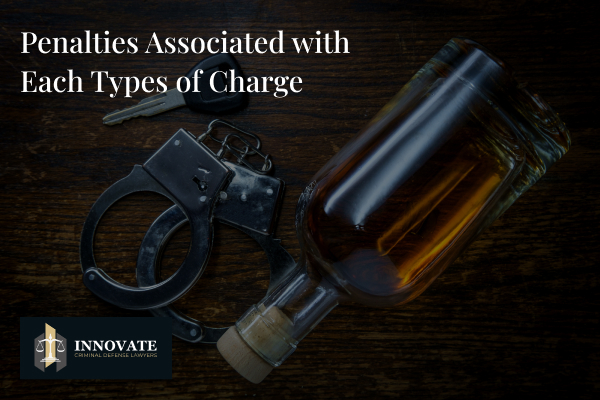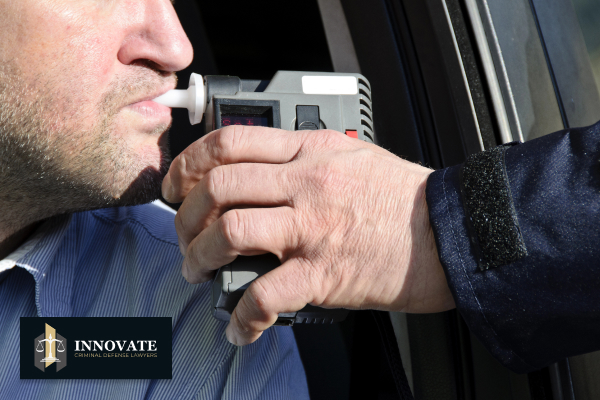
When you're caught driving under the influence (DUI) or driving while intoxicated (DWI), you might wonder which one is worse. Both charges indicate that you were driving in a way that's not safe because of alcohol or drugs.
But there are differences between them that can affect the penalties you might face. At Innovate Criminal Defense Lawyers, we can help you if you have been charged with a DUI or DWI.
DUI and DWI charges can lead to major consequences, including fines, jail time, and a mark on your driving record. Each state has its own laws defining DUI and DWI, making some aspects of these charges more severe than others.
The details of your situation, like your blood alcohol concentration (BAC) or if you've been charged before, play a big role in what happens next. It's important to clarify the differences and similarities between DUI and DWI.
People often use DUI and DWI interchangeably when discussing drunk driving. Practically speaking, these offenses are the same in terms of the punishment. However, they are defined differently, and what the prosecutor must prove to establish your guilt is different.
DUI stands for driving under the influence. DWI means driving while intoxicated or impaired. Both charges deal with driving a vehicle while you are compromised by alcohol or drugs.
The main difference often lies in the level of impairment or the substance involved. Some states use the terms interchangeably, while others have distinct definitions for each.
In many places, the legal limit for your BAC while driving is 0.08% under federal legal limits. If your BAC is above this limit, you can be charged with a DUI or DWI. However, you can also face charges if your BAC is lower but you are showing signs of impairment.
usually describes driving under the influence of alcohol or drugs. It emphasizes the effect substances have on your ability to drive safely.
An individual with a BAC of 0.08% or higher with be charged with driving under the influence (DUI). As such, DUI charges are the more serious of the two.
Driving while intoxicated (DWI) can mean either driving while intoxicated with alcohol to the point of impairment or driving while impaired by drugs. In some states, DWI stands for driving with an unlawful alcohol concentration, regardless of impairment signs.
If you give your car keys to someone you know is impaired and they drive, you could face a DWI conviction under the legal theory of aiding and abetting.
Both charges are critical, but the distinction often lies in the level of impairment and the substances involved. Your DUI/DWI conviction only occurs at the climax of your court session.
While prosecutors may charge a defendant with both DUI and DWI at the same time, a defendant may only be convicted of one of these charges.
If convicted of DUI, the DWI charge will be merged into the DUI charge. Conversely, defendants convicted of DWI may not be convicted of DUI as the elements of DWI fall short of those for DUI.

The penalties for DUI and DWI charges can include fines, prison time, and a license suspension. They can also lead to increased auto insurance rates and the requirement to install an ignition interlock device on your vehicle.
The specifics depend on your state's laws and the details of your case. You will have an MVA hearing where they will decide if they should restrict your driving privileges in any way.
Repeat cases usually result in more severe penalties, including longer jail sentences and higher fines. In some cases, a DUI or DWI can be classified as a felony, especially if it resulted in an accident or injury. Knowing these potential penalties is vital for anyone facing a DUI or DWI charge.
A DUI or DWI charge can have a lasting impact on your driving record. This can impact your insurance rates and ability to drive. Many insurers dramatically raise premiums for drivers with these charges on their records. In some cases, you might even find it difficult to secure a policy from an auto insurance company.
Beyond the immediate legal penalties, a DUI or DWI can affect your employment opportunities and social reputation. The charges might restrict your ability to travel to certain countries or hold specific jobs. These long-term consequences highlight the importance of taking DUI and DWI charges seriously.


Having an experienced attorney is essential when facing DUI or DWI charges. A skilled lawyer can guide you through the complex legal system and advocate for your best interests. They can also help minimize the charges' potential penalties and long-term impacts.
Proper legal representation can highly affect the outcome of your case. From challenging evidence to negotiating with prosecutors, a good lawyer will use every available strategy to defend you.
The social implications of a DUI or DWI charge can be daunting. You might face judgment from your community or changes in personal relationships. It's important to address these challenges head-on, with the support of family, friends, and professional counsel.
Our team understands the personal and social stakes involved. We're here to help you manage your charges' repercussions, offering legal and moral support. A drunk driving or DWI conviction can change your life forever. If you are facing allegations of DUI offense, let our team help you.

Processing a DUI or DWI charge can be one of the most challenging times in your life. The potential legal, financial, and social consequences are great. But with the right legal team by your side, you can go through this complex process and aim for the best possible outcome.
At Innovate Criminal Defense Lawyers, we understand how severe DWI penalties can be. Driving over the federal legal limit for blood alcohol concentration comes with severe ramifications. Whether you are facing a DUI or DWI offense, you need a robust defense. Contact us today for a free consultation.